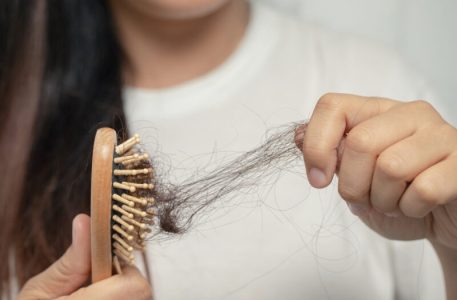Understanding the Connection Between Losing Hair and Weight Loss: A Comprehensive Guide
Introduction

Losing Hair and Weight Loss
Hair loss can be a distressing experience, and when combined with weight loss, it often leads to questions about the underlying causes and connections. Losing hair and weight loss are two phenomena that, while seemingly unrelated, can share common triggers. This blog post aims to delve into the intricacies of both, explore their relationship, and offer insights into managing and preventing these concerns.
Understanding Losing Hair and Weight Loss and Its Causes
What Constitutes Weight Loss?
Weight loss refers to the reduction of total body mass, including loss of fat, muscle, and sometimes even fluid. It can be intentional, as part of a fitness or health goal, or unintentional, due to an underlying medical condition or lifestyle change.
Common Causes of Losing Hair and Weight Loss
1. Dietary Changes and Caloric Deficit
– Switching to a low-calorie diet can lead to a decrease in body weight.
2. **Increased Physical Activity**
– Engaging in regular exercise helps burn calories, contributing to weight reduction.
3. **Medical Conditions**
– Conditions like hyperthyroidism, diabetes, and gastrointestinal disorders can result in unintentional weight loss.
4. **Stress and Psychological Factors**
– Emotional stress or mental health issues may lead to changes in eating habits, impacting weight.
### Hair Loss: An Overview
**Types of Hair Loss**
1. **Androgenetic Alopecia**
– Commonly known as male or female pattern baldness, attributed to genetic factors and hormonal changes.
2. **Telogen Effluvium**
– A temporary form of hair loss triggered by stress, diet, or lifestyle changes, causing hair follicles to enter a resting phase prematurely.
3. **Alopecia Areata**
– An autoimmune disorder where the immune system attacks hair follicles, resulting in patchy hair loss.
**Contributing Factors to Hair Loss**
– **Genetics and Hormones**
– **Nutritional Deficiencies**
– **Medical Treatments and Medications**
– **Physical or Emotional Stress**
### The Connection Between Losing Hair and Weight Loss
**How Weight Loss Can Lead to Hair Loss**
1. **Nutritional Deficiencies**
– Rapid weight loss or restrictive diets often result in insufficient intake of essential nutrients, like protein, iron, and vitamins, vital for hair growth.
2. **Physical Stress on the Body**
– The body perceives significant weight loss as a form of physical stress, which can trigger hair loss.
3. **Hormonal Imbalances**
– Sudden weight changes can lead to hormonal imbalances, affecting hair health.
**Stress and Lifestyle Factors**
– **Emotional Stress from Weight Goals**
– The pressure to achieve weight loss goals can culminate in stress, causing telogen effluvium.
– **Exercise Intensity and Impact**
– Excessive and intense exercise regimes without adequate nutrition can strain the body, contributing to hair loss.
### Preventing Hair Loss While Losing Weight
**Balanced Diet and Nutrition**
1. **Prioritize Protein Intake**
– Proteins are the building blocks for hair. Include lean meats, fish, legumes, and nuts.
2. **Incorporate Essential Vitamins and Minerals**
– Ensure a diet rich in iron, zinc, vitamins A, C, D, and E, and biotin for optimal hair health.
3. **Stay Hydrated**
– Adequate hydration supports overall bodily functions and hair health.
**Mindful Weight Loss Practices**
– **Gradual Weight Loss**
– Aim for a steady and sustainable weight loss to minimize physical stress.
– **Incorporate Rest Days**
– Ensure your exercise routine includes rest periods to allow the body to recover.
– **Manage Stress Levels**
– Practice stress-reducing activities like yoga or meditation to maintain mental well-being.
### Seeking Professional Help
**When to See a Doctor**
– Evidence of excessive hair loss alongside weight loss warrants a consultation with healthcare professionals to rule out underlying medical conditions.
– Specialists such as dermatologists and nutritionists can offer tailored advice and treatment plans.
**Medical Treatments and Interventions**
1. **Supplements and Medications**
– If needed, doctors may suggest supplements to address nutritional deficiencies.
2. **Therapeutic Options for Hair Regrowth**
– Medications like minoxidil or hair transplantation might be considered for severe cases.
### Conclusion
Navigating the dual challenges of losing hair and weight loss requires a balanced approach, emphasizing nutrition, stress management, and healthy lifestyle changes. Understanding the connection between these two issues can empower individuals to make informed decisions that promote overall health and well-being. Whether the cause is dietary choices, stress, or medical conditions, addressing the root causes is crucial for effectively managing hair loss while achieving weight loss goals.
Resources- https://www.healthline.com/nutrition/weight-loss-and-hair-loss